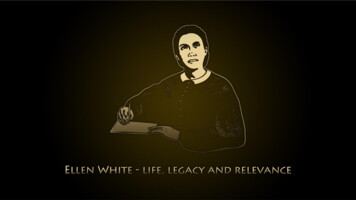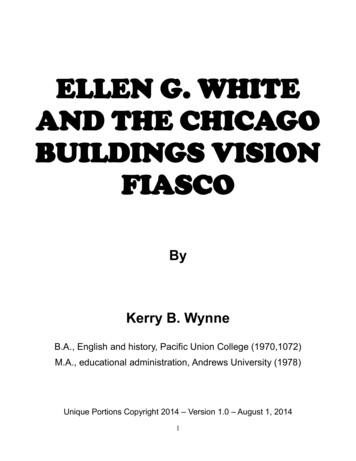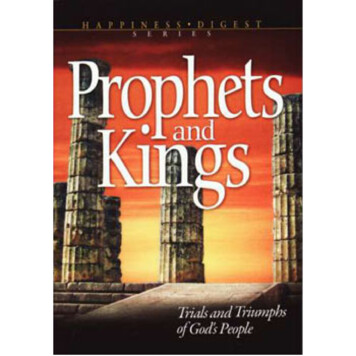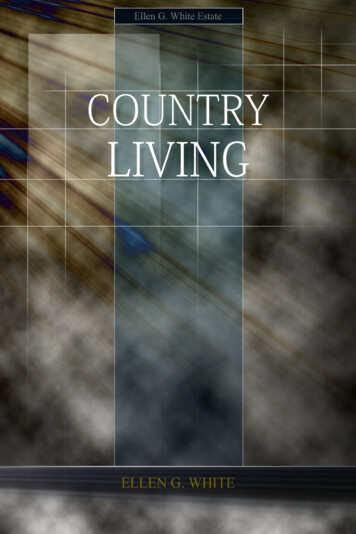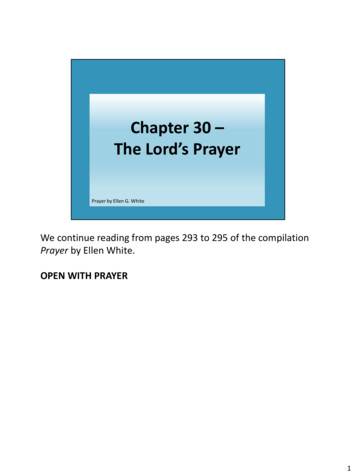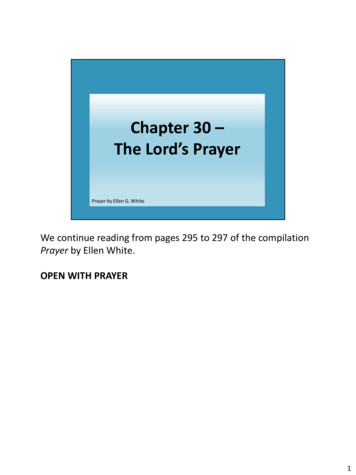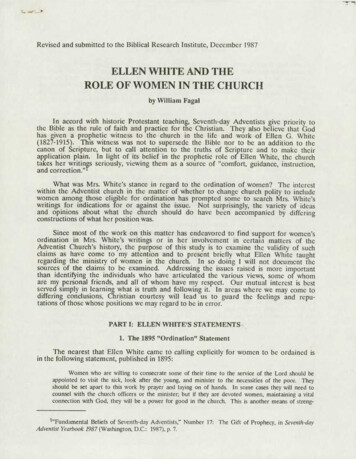
Transcription
Revised and submitted to the Biblical Research Institute, December 1987ELLEN WHITE AND THEROLE OF WOMEN IN THE CHURCHby William FagalIn accord with historic Protestant teaching, Seventh-day Adventists give priority tothe Bible as the rule of faith and practice for the Christian. They also believe that Godhas given a prophetic witness to the church in the life and work of Ellen G. White(1827-1915). This witness was not to supersede the Bible nor to be an addition to thecanon of Scripture, but to call attention to the truths of Scripture and to make theirapplication plain. In light of its belief in the prophetic role of Ellen White, the churchtakes her writings seriously, viewing them as a source of "comfort, guidance, instruction,and correction."What was Mrs. White's stance in regard to the ordination of women? The interestwithin the Adventist church in the matter of whether to change church polity to includewomen among those eligible for ordination has prompted some to search Mrs. White'swritings for indications for or against the issue. Not surprisingly, the variety of ideasand opinions about what the church should do have been accompanied by differingconstructions of what her position was.Since most of the work on this matter has endeavored to find support for women'sordination in Mrs. White's writings or in her involvement in certain matters of theAdventist Church's history, the purpose of this study is to examine the validity of suchclaims as have come to my attention and to present briefly what Ellen White taughtregarding the ministry of women in the church. In so doing I will not document thesources of the claims to be examined. Addressing the issues raised is more importantthan identifying the individuals who have articulated the various views, some of whomare my personal friends, and all of whom have my respect. Our mutual interest is bestserved simply in learning what is truth and following it. In areas where we may come todiffering conclusions, Christian courtesy will lead us to guard the feelings and reputations of those whose positions we may regard to be in error.PART I: ELLEN WHITE'S STATEMENTS1. The 1895 "Ordination" StatementThe nearest that Ellen White came to calling explicitly for women to be ordained isin the following statement, published in 1895:Women who are willing to consecrate some of their time to the service of the Lord should beappointed to visit the sick, look after the young, and minister to the necessities of the poor. Theyshould be set apart to this work by prayer and laying on of hands. In some cases they will need tocounsel with the church officers or the minister; but if they are devoted women, maintaining a vitalconnection with God, they will be a power for good in the church. This is another means of streng1 "Fundamental Beliefs of Seventh-day Adventists," Number 17: The Gift of Prophecy, in Seventh-dayAdventist Yearbook 1987 (Washington, D.C.: 1987), p. 7.
thening and building up the church. We need to branch out more in our methods of labor. Not ahand should be bound, not a soul discouraged, not a voice should be hushed; let every individuallabor, privately or publicly, to help forward this grand work. Place the burdens upon men andwomen of the church, that they may grow by reason of the exercise, and thus become effectiveagents in the hand of the Lord for the enlightenment of those who sit in darkness. 2This statement clearly calls for a setting apart to a special work. On the basis ofthe counsel that these women "be set apart to this work by prayer and laying on ofhands," we might even venture to use the term "ordination." But ordination to what?Note the elements of her statement.This ministry is part-time. "Women who can devote some of their time. . . ."Therefore, from the start, it does not seem to be referring to pastoralministry.The work is something other than what the church was already doing. "This isanother means of strengthening and building up the church. We need tobranch out more in our methods of labor."It may not even involve holding a church office in the usual sense of the term.The women should be "appointed." The clause, "In some cases they will needto counsel with the church officers 3 or minister," may be construed as placingthem in a category other than that of church officer, although this is by nomeans certain. Yet it is clear that they are not equated with "the minister,"nor are they being regarded as the officers whose responsibility it is to leadthe local congregation.So was Mrs. White here calling for an ordained woman ministry? If one uses theterm "ministry" in its broad sense of service, yes. But she has clearly distinguished this"ordained ministry" from that of the pastor or the leading church officers. To say thatthis statement supports ordaining women to positions of congregational leadership orecclesiastical authority is, it seems to me, simply not supported by the elements of thestatement itself.The Context of the Statement. The article in which the statement is contained,entitled "The Duty of the Minister and the People," is a call for involvement of the laityin the work of the church, which ministers and conference officers were apparentlyundervaluing and discouraging. Its purpose is not to change the structure of the pastoralministry, but rather to change its emphasis from one in which most of the burdens areseized and carried by the minister, to one in which the laity is active and motivated inthe work of the church. A candid reading of the entire article will make this clear,especially the following portion, which even refers to one of the duties of the womenappointees mentioned:2Advent Review and Sabbath Herald (hereinafter Review and Herald or simply Review) 72, 28 (July 9,1895): 434.3 The assertion, advanced by some, that "church officers" here refers to conference officials is unlikelyin view of Ellen White's use twice in this article of the term "conference officers" to refer to this groupand her corresponding single use of "officers of the church" to refer to the local church leaders. Sheseems to have been able to avoid ambiguity on this point.-2-
The minister's work is the lay member's work as well. Heart should be bound to heart. Let all pressforward, shoulder to shoulder. Is not every true follower of Christ open to receive his teachings?And should not all have an opportunity to learn of Christ's methods by practical experience? Whynot put them to work visiting the sick and assisting in other ways, and thus keep the church in aworkable condition? All would thus be kept in close touch with the minister's plans, so that hecould call for their assistance at any moment, and they would be able to labor intelligently with him.All should be laborers together with God, and then the minister can feel that he has helpers in whomit is safe to trust. The minister can hasten this desirable end by showing that he has confidence inthe workers by setting them to work. 42. "Ordination" of Women PhysiciansSince Mrs. White said that women should train as physicians, 5 and in anotherstatement she calls for a "setting apart" of physicians who are engaged in missionarywork and soul-winning, some have felt that here we would find her authorization forordaining women. The latter statement reads:The work of the true medical missionary is largely a spiritual work. It includes prayer and thelaying on of hands; he therefore should be as sacredly set apart for his work as is the minister ofthe gospel. Those who are selected to act the part of missionary physicians, are to be set apart assuch. This will strengthen them against the temptation to withdraw from the sanitarium work toengage in private practice. No selfish motive should be allowed to draw the worker from his post ofduty. We are living in a time of solemn responsibilities; a time when consecrated work is to be done.Let us seek the Lord diligently and understandingly. 6Does Ellen White here call for physicians to be ordained as ministers? If that iswhat she meant, she could have said so much more directly: "he therefore should be setapart as a minister." But her wording, as I understand it, is more circuitous simplybecause she intends something else. He is to be as sacredly set apart as is the minister.The missionary physician is to be set apart as such. As what? As a missionary physician. That is made even clearer by the motivation for doing it--to strengthen himagainst the temptation to leave the sanitarium work to engage in private practice.Ordaining physicians as ministers would not be likely to have a bearing on that, butordaining them as missionary physicians would.In speaking of the spiritual nature of the work of a true medical missionary, Mrs.White says this work "involves prayer and the laying on of hands." No one would arguethat she was here saying that the work of the medical missionary involved ordainingpeople to the gospel ministry, or even ordaining elders. Quite clearly she is herespeaking of prayer for the sick. This statement is an indication that the expression"prayer and the laying on of hands" may refer to more than one thing, not simply toordination to the gospel ministry.So again we return to the important question to ask when considering thesestatements of Ellen White: when she called for ordination, it was ordination to what?This statement will not support the assertion that she called for women to be included inthe ordained pastoral ministry.4Review and Herald 72, 28 (July 9, 1895): 433, emphasis original.5 See,for instance, Ellen G. White, Medical Ministry (Mountain View, California, 1932), p. 140.6 EllenG. White, Evangelism (Washington, D. C., 1946), p. 546 (Manuscript 5, 1908).-3-
3. Women in the Gospel MinistryEllen White said clearly, "There are women who should labor in the gospel ministry.In many respects they would do more good than the ministers who neglect to visit theflock of God." 7 Women who do such labor, especially full-time, were to be paid fairlyfor their work from the tithe. "The tithe should go to those who labor in word anddoctrine, be they men or women." 8 She added, "Seventh-day Adventists arc not in anyway to belittle woman's work." 9From statements such as these, some have concluded that Mrs. White called forelimination of any role distinction between men and women in the ministry of theAdventist Church. They infer that, since she clearly urged fairness in the treatment ofwomen workers, we should understand this to include ordination to the gospel ministryirrespective of gender.Did Mrs. White intend that such a use be made of her statements? In the absenceof a statement from her addressing the issue directly, absolute proof may be beyond us.But we can gather evidence from her statements that may help us to determine moreprecisely what she was and was not saying.Personal Ministry. First, we must let Mrs. White tell us what kind of work she istalking about when she says, "There are women who should labor in the gospel ministry." 1 The statement comes from Manuscript 43a, 1898 (Manuscript Release #330),which opens with this paragraph:Some matters have been presented to me in regard to the laborers who are seeking to do all intheir power to win souls to Jesus Christ. The ministers are paid for their work, and this is well.And if the Lord gives the wife as well as the husband the burden of labor, and if she devotes hertime and her strength to visiting from family to family, opening the Scriptures to them, although thehands of ordination have not been laid upon her, she is accomplishing a work that is in the line ofministry. Should her labors be counted as nought, and her husband's salary be no more than that ofthe servant of God whose wife does not give herself to the work, but remains at home to care forher family? 11The subject under discussion is the pay of ministers' wives, and the kind of workthey are doing is described: visiting homes and opening the Scriptures to the families.Further, Mrs. White dismisses the matter of ordination as irrelevant to the issue, ratherthan seeing it as a remedy to the injustice regarding pay. Her point is simply that theseministers' wives, who are functioning as what we would call Bible Instructors, are"accomplishing a work that is in the line of ministry," and they should be paid for it.7Evangelism, p. 472.8/bid.,p. 492; see also p. 491 for fairness in pay.9/bid.,pp. 492-493.10/bid.,p. 472.11 She protests such practices through much of the manuscript. More of what she says here may beseen in Evangelism, pp. 492.3-493.2, though the material is credited to other, later books and manuscripts ofMrs. White.-4-
Later in the same document she again refers to this visitation-oriented work thesewomen were doing and includes an implied rebuke to the ministers who were not doingit.If women do the work that is not the most agreeable to many of those who labor in word anddoctrine, and if their works testify that they are accomplishing a work that has been manifestlyneglected, should not such labor be looked upon as being as rich in results as the work of theordained ministers? Should it not command the hire of the laborer? 12It is in this setting that Mrs. White's statement, "There are women who shouldlabor in the gospel ministry," appears. The sentence that follows it again underscoresthe nature of the work she envisioned, for these women: "In many respects they woulddo more good than the ministers who neglect to visit the flock of God." Immediately sheadds, "Husband and wife may unite in this work, and when it is possible, they should.The way is open for consecrated women." 13So it seems that she is not calling for women to have role-interchangeability withmen, but rather a complementary ministry that focuses on personal work. Her statementsseem primarily to deal with ministers' wives, encouraging a husband-wife ministry. Shenoted the lack of ordination for the woman, but gave no indication that she was callingfor that status to change. On the other hand, she left no doubt that the status of thepay issue should change:This question is not for men to settle. The Lord has settled it. You are to do your duty tothe women who labor in the gospel, whose work testifies that they are essential to carry the truthinto families. Their work is just the work that must be done. In many respects a woman can impartknowledge to her sisters that a man cannot. The cause would suffer great loss without this kind oflabor. Again and again the Lord has shown me that women teachers are just as greatly needed to dothe work to which He has appointed them as are men. They should not be compelled by the sentiments and rules of others to depend upon donations for their payment, any more than should theministers. 14In another place Mrs. White talked about the same problem, and named some of thewomen she was concerned for as well as describing their work:There are ministers' wives, Srs. Starr, Haskell, Wilson and Robinson, who have been devoted,earnest, whole-souled workers, giving Bible readings and praying with 'families, helping along bypersonal efforts just as successfully as their husbands. These women give their whole time, and aretold that they receive nothing for their labors because their husbands receive wages. . . . I will feelit my duty to create a fund from my tithe money, to pay these women who are accomplishing just asessential work as the ministers are doing, and this tithe I will reserve for work in the same line as12Evangelism, p. 493, credited there to Manuscript 142, 1903, but appearing also also in Manuscript43a, 1898 (Manuscript Release #330).13 Manuscript Release #330, p. 3 (Manuscript 43a, 1898). Manuscript Releases are available from theEllen G. White Estate, 6840 Eastern Avenue, NW, Washington, D. C. 20012.141b id.-5-
that of ministers, hunting for souls, fishing for souls. . . . These sisters are giving their time toeducating those newly come to the faith. . . 15As nearly as I can tell, this is the kind of "gospel ministry" that Ellen Whiteenvisioned women doing. In all the places that I have seen where she defines ordescribes gospel ministry for women, she does so in terms of this personal work,especially directed toward other women and families. She seems to have been thinkingespecially, though perhaps not exclusively, about the wives of ministers and theiropportunities for service. She believes that the ordained ministers should also "visit theflock of God," but she sees in women a special suitability to this work.4. Women as Pastors to the FlockIn the above statement from 1898, in which Ellen White says "There are women whoshould labor in the gospel ministry," she describes that labor as we would the work of aBible Instructor. She associated this work with care for (visiting) "the flock of God."This statement may provide a key to a clearer understanding of a statement publishedtwo years later:All who desire an opportunity for true ministry, and who will give themselves unreservedly toGod, will find in the canvassing work opportunities to speak upon many things pertaining to thefuture, immortal life. The experience thus gained will be of the greatest value to those who arefitting themselves for the ministry. It is the accompaniment of the Holy Spirit of God that preparesworkers, both men and women, to become pastors to the flock of God. 16The remainder of the paragraph describes the benefits of character and experience thatwill come to those who engage in the canvassing work.Some hold that Ellen White is here calling for women, under the preparation of theHoly Spirit, to become gospel ministers in the commonly-accepted sense of the termtoday, that is, the conference-employed, perhaps even ordained, leader of a localcongregation. But is that how she used the term "pastor" in this passage?First, though "pastor" may be our common term, it was not Ellen White's. Hercommon term was "minister." Our laserdisc concordance of the published writings ofMrs. White shows that her usages of "minister," "ministers," "minister's," etc. (whichinclude uses as verbs), outnumber use of similar words built around "pastor" by morethan 50 to 1. Even so, by far the majority of her uses of these "pastor" terms simplydesignates the minister at the head of the congregation.But in some passages we find evidence of other meanings. In such statements theterm "pastor" is often used in connection with "the flock." The references show concernfor nurture of God's people, as a shepherd might show tender personal care for eachindividual sheep. One such reference where Mrs. White makes this nurturing connotationexplicit is in the following account, written from Australia in 1892:Elder H used to live here and preach to the people, but he was not a shepherd of the flock.He would tell the poor sheep that he would rather be horse-whipped than visit. He neglected15 Manuscript Release #959, pp. 1-2 (Letter 137, 1898).16 Ellen G. White, Testimonies for the Church (hereinafter Testimonies) (Mountain View, California,1948), Volume 6, p. 322.-6-
personal labor, therefore pastoral work was not done in the church and its borders. . . . Had thepreacher done the work of a pastor, a much larger number would now be rejoicing in the truth. 17Other examples of this specialized usage of "pastor" may be cited briefly. Inreferring to ministers who have educated themselves as debaters, Mrs. White said, "Inmany respects men trained in this kind of school unfitted themselves to become pastorsof the sheep and lambs." 18 Speaking of ministers who devote excessive time to readingand writing, she says, "The duties of a pastor are often shamelessly neglected becausethe minister lacks strength to sacrifice his personal inclinations for seclusion and study.The pastor should visit from house to house among his flock, teaching, conversing, andpraying with each family, and looking out for the welfare of their souls." 19Her concern for personal care for the flock is expressed again this way: "Responsibilities must be laid upon the members of the church. The missionary spirit should beawakened as never before, and workers should be appointed as needed, who will act aspastors to the flock, putting forth personal effort to bring the church up to thatcondition where spiritual life and activity will be seen in all her borders." 2 In eachinstance here the concept of "pastor" is associated with personal work for the flock ofGod, even when it is done by "members of the church" rather than the minister. Onewho visits families, teaching them and praying with them, showing personal care andinterest, is doing pastoral work.Second, the work of the Adventist minister in Ellen White's time was quite differentfrom the work of the "pastor" as we know it today. The ministers were largely evangelists, raising up a church in a place, getting it established, and then moving on toanother place. The idea of a settled ministry whose duties were primarily with thosewho were already believers is a fairly recent innovation in the Adventist Church,developing in the 1930's, 40's, and especially 50's. 21 In the setting of such an itinerantministry, Mrs. White's term, "pastors to the flock of God," at times denotes not so muchan office as a function, performed in personal ministry to the sheep of Jesus's flock.This is why canvassing is such a good preparation for ministry. It gets the workerout visiting in homes, doing personal labor, seeking to bring the lost sheep into theLord's flock, or (we might say) pastoring the flock of God. It is a work that both menand women can and should do. But such a work does not necessarily involve appointment to the headship role of a congregation or ordination to the gospel ministry.17 Manuscript Release #763, pp. 5-6 (from "Experiences in Australia," p. 53, written in Adelaide,Australia, Oct. 11, 1892).18Manuscript19EllenRelease #761, p. 10 (Manuscript 24, 1888).G. White, Gospel Workers (Washington, D. C., 1948), p. 337.20 Testimonies,Vol. 5 , p. 723.21 Ken Corkum, "The Role of the Seventh-day Adventist Minister in Public Evangelism," D.Min.Dissertation (Berrien Springs, Mich.: Andrews University, 1986), pp. 98-101. For unequivocal statements byA. G. Daniells and George Starr regarding the non-settled nature of ministerial work during Mrs. White'slifetime, see Corkum, pp. 32 and 90. Other related statements by Daniells, Mrs. White, and others may befound in Corkum, especially pp. 50-91.-7-
Third, in a parallel passage a few pages later in the same book, Ellen Whiteexplicitly shows that her endorsement of canvassing as preparation for the ministry isbased on its orientation toward personal ministry in the home:Some men whom God was calling to the work of the ministry have entered the field ascanvassers. I have been instructed that this is an excellent preparation if their object is to disseminate light, to bring the truths of God's word directly to the home circle. In conversation the waywill often be opened for them to speak of the religion of the Bible. If the work is entered upon asit should be, families will be visited, the workers will manifest Christian tenderness and love forsouls, and great good will be the result. This will be an excellent experience for any who have theministry in view.Those who are fitting for the ministry can engage in no other occupation that will give themso large an experience as will the canvassing work. 22This personal work of visiting families in the home, which is at the heart of thecanvassing work, is the very method of labor for which Mrs. White said women wereespecially fitted and in which they could do a work "in the line of ministry" that mencould not do.Fourth, if Mrs. White intended to open the regular pastoral ministry to women, wemight well expect her to do so as more than an aside in an article entitled, "TheCanvasser a Gospel Worker," where the focus is on the canvassing work. In fact, in thesame volume of Testimonies, we have an article entitled, "Women to Be Gospel Workers."23 In it she again features the need for women to do personal work in families andwith other women, with no mention of these workers being ministers in the regular senseof the word.Elsewhere in this same volume Ellen White discusses the need for more ministers tobe trained and enter the field. If at this time she had wanted the church to open theregular ministerial option for women, well might she have said so here. But note thereferences to gender in the following statement:There is an urgent demand for laborers in the gospel field. Young men are needed for thiswork; God calls for them. Their education is of primary importance in our colleges, and in no caseshould it be ignored or regarded as a secondary matter. It is entirely wrong for teachers, bysuggesting other occupations, to discourage young men who might be qualified to do acceptable workin the ministry. Those who present hindrances to prevent young men from fitting themselves for thiswork are counterworking the plans of God, and they will have to give an account of their course.There is among us more than an average of men of ability. If their capabilites were brought intouse, we should have twenty ministers where we now have one. 24This view is reinforced later in the same volume where Section Seven, "Calls toService," opens with an article entitled, "Young Men in the Ministry." 25 Among numerous calls there for "men" and "young men" to enter the ministry, there is no mention of22 Testimonies, Volume 6, p. 334.23 Testimonies, Volume 6, pp. 114-118.24/bid.,p. 135.25 Ibid., pp. 411-416.-8-
women being urged to join the ranks of the ministers, mention which we might wellexpect if it had been Mrs. White's intention earlier in the volume to indicate that womenas well as men were to prepare for the regular gospel ministry.So in the statement with which this section opened, in which Mrs. White said that"the accompaniment of the Holy Spirit. . . prepares workers, both men and women, tobecome pastors to the flock of God," was she calling for women as well as men to bepastors in today's sense of the term? Her use of the term "pastor" to describe afunction as well as an office and her recognition that the two did not always gotogether leave open an alternative interpretation--that "pastors to the flock of God"designates those who exercise a personal ministry of visitation and instruction in thehome. If one chooses to adopt the alternative explanation, then the statement isharmonious with other statements Mrs. White makes about the kind of work women areespecially qualified to do, fulfilling a role that is complementary to that of men. It alsoharmonizes with her specifically male-directed calls for ministerial workers in the samevolume of the Testimonies. If on the other hand one chooses to say that this passagedoes call for women to serve in the office of pastor, then one must account for thesingularity of this statement--there are no other, different statements that make thesame point in an unequivocal manner.5. Women Engaged in the MinistrySome have thought a passage from Testimonies, Vol. 8, pp. 229-230 provided such adifferent, confirming statement about women serving as ministers in the same capacity asmen: "Young men and young women who should be engaged in the ministry, in Biblework, and in the canvassing work should not be bound down to mechanical employment."The context is a call for our institutions to train the young people for evangelistic work.Here it seems that "the ministry" is distinguished from "Bible work," a distinction thatseems somewhat blurred in other major statements.One could argue that in this statement Mrs. White is urging both young men andwomen to go into all three lines of labor. But that is not necessarily the case. Thestatement may be understood simply to be urging young people to go into whatever lineof evangelistic work is suitable to them, without trying to specify what is appropriate toeach gender. To make such a distinction clear is difficult without the sentence becomingwordy and ungainly. And one should note that the burden of the message is not tochange church polity to make room for women to serve in the same capacities as men,but rather to encourage the employment of both men and women in soul-winning workrather than in manual labor.6. Not Always Men Most Fitted to Manage a ChurchIn 1879 Mrs. White wrote to a Brother Johnson, "It is not always men who are bestadapted to the successful management of a church. If faithful women have more deeppiety and true devotion than men, they could indeed by their prayers and their labors domore than men who are unconsecrated in heart and in life." 26Though a hasty reading might make this passage seem to encourage women to seekthe "management" roles in a church, which some would identify with pastor or elder, amore careful reading of what the statement actually says will indicate that it is not a26 ManuscriptRelease #794, p. 2 (Letter 33, 1879).-9-
blanket endorsement of role interchangeablility in the church. The statement itselfshows that it is addressed to a specific problem.Mrs. White here allows for times in which women might be better suited to the"management" of a church, though she does not define "management" in this statement.The condition under which women would be better suited is then given: "If faithfulwomen have more deep piety and true devotion than men, they could indeed . . . do morethan men who are unconsecrated in heart and in life." When the men are spirituallyunfit, devout women would be better adapted to the work. Better to have a woman leadthan to be led by those out of harmony with Christ.So on the face of it, this statement is not a reasoned plea for expanding theordained ministry of the church to include women. This becomes clearer when one looksat the passage in its larger setting.Context: Reproof. I was startled as I read the entire letter. It is a letter ofreproof, and a very s
ELLEN WHITE AND THE ROLE OF WOMEN IN THE CHURCH by William Fagal In accord with historic Protestant teaching, Seventh-day Adventists give priority to the Bible as the rule of faith and practice for the Christian. They also believe that God has given a prophetic witness to the church in the life and work of Ellen G. White (1827-1915).


